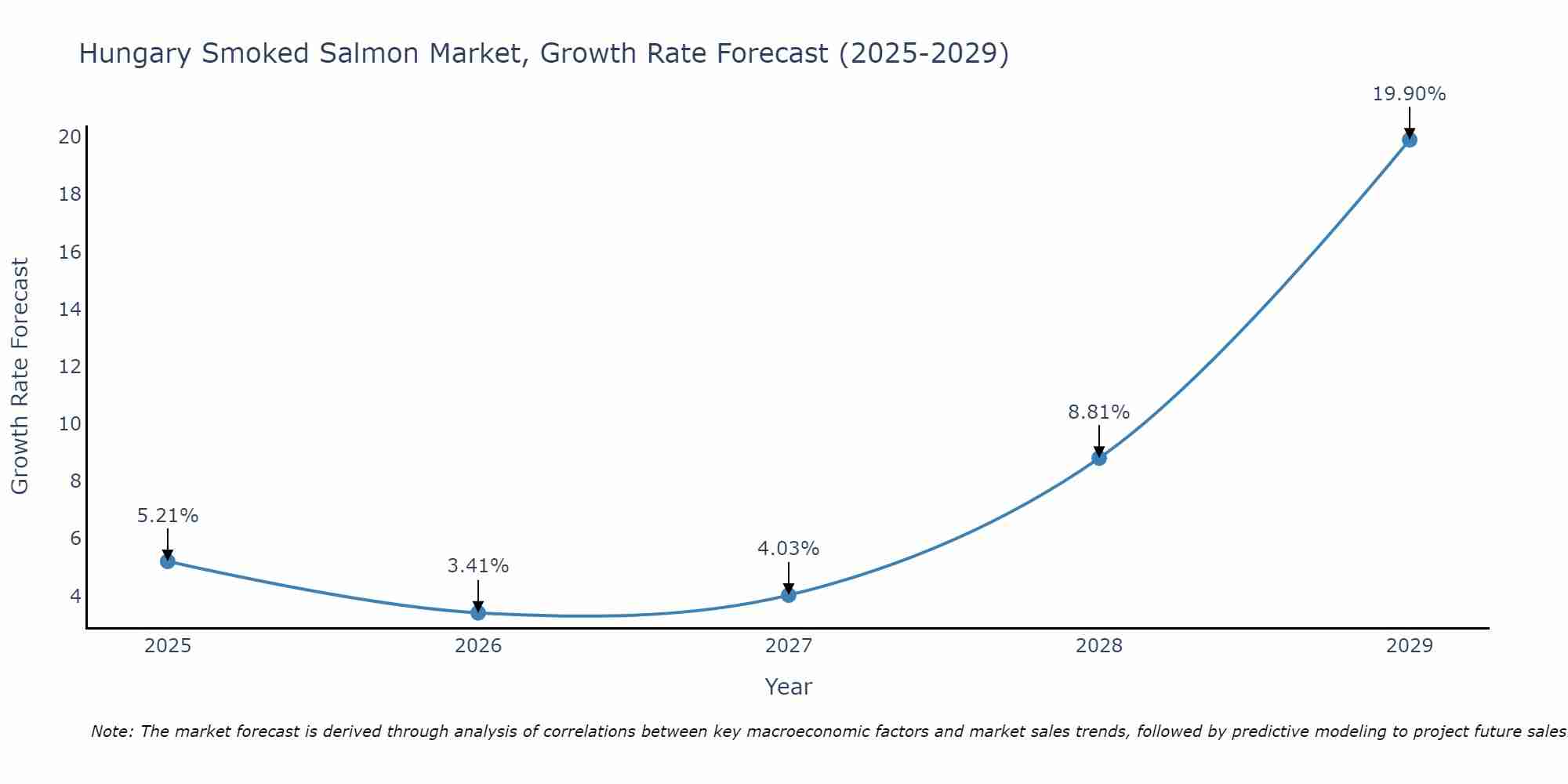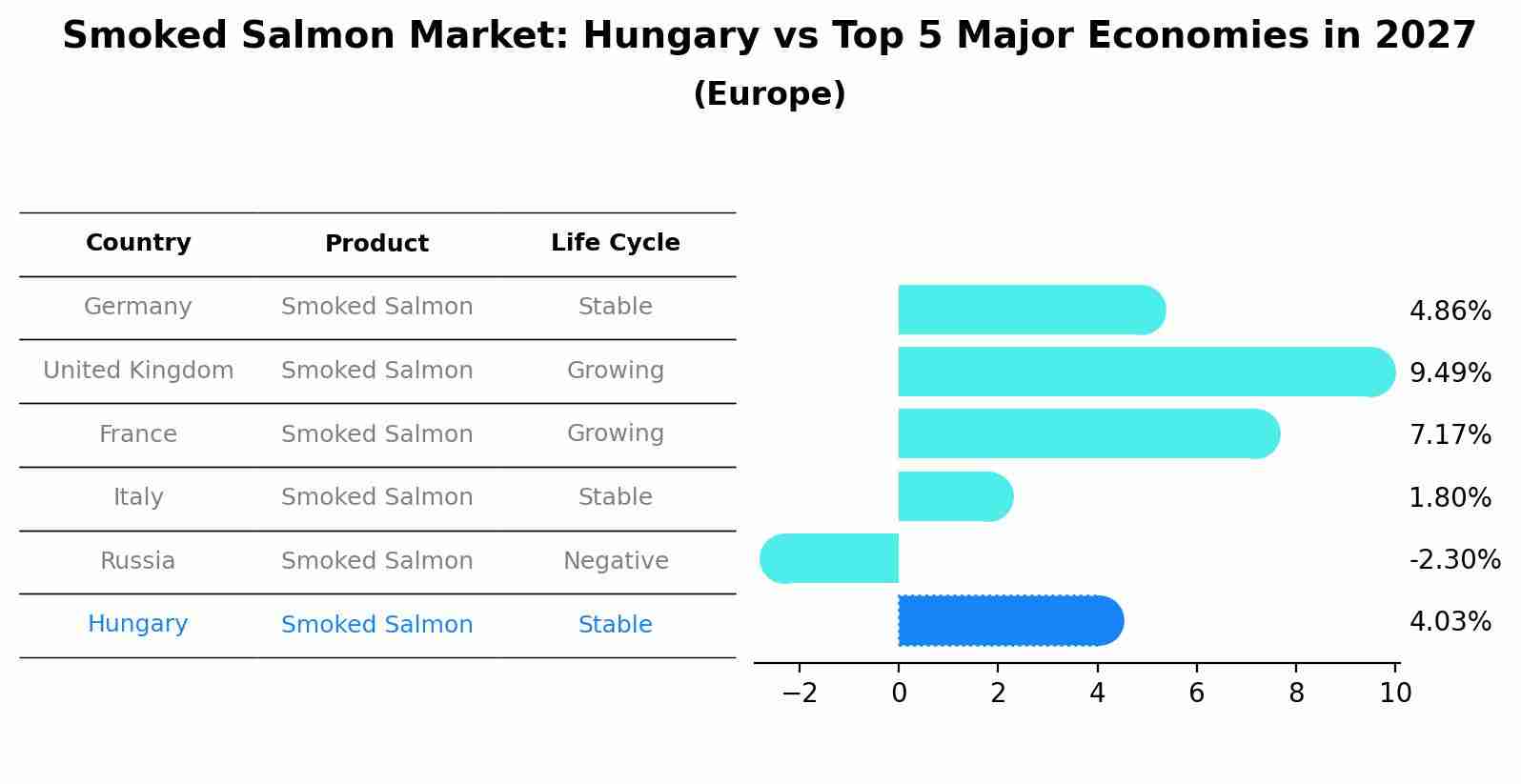Hungary Smoked Salmon Market (2025-2031) Outlook | Size, Value, Revenue, Forecast, Share, Trends, Analysis, Industry, Growth & Companies
| Product Code: ETC387859 | Publication Date: Aug 2022 | Updated Date: Jul 2025 | Product Type: Market Research Report | |
| Publisher: 6Wresearch | Author: Dhaval Chaurasia | No. of Pages: 75 | No. of Figures: 35 | No. of Tables: 20 |
Hungary Smoked Salmon Market Size Growth Rate
The Hungary Smoked Salmon Market is projected to witness mixed growth rate patterns during 2025 to 2029. The growth rate starts at 5.21% in 2025 and reaches 19.90% by 2029.

Smoked Salmon Market: Hungary vs Top 5 Major Economies in 2027 (Europe)
By 2027, Hungary's Smoked Salmon market is forecasted to achieve a stable growth rate of 4.03%, with Germany leading the Europe region, followed by United Kingdom, France, Italy and Russia.

Hungary Smoked Salmon Market Synopsis
The Hungary smoked salmon market is experiencing steady growth due to increasing consumer demand for premium seafood products. Smoked salmon is becoming popular among Hungarian consumers for its rich flavor, versatility in culinary applications, and perceived health benefits. The market is driven by a growing preference for convenient and ready-to-eat seafood options, as well as a rising interest in gourmet and specialty food products. Key players in the Hungary smoked salmon market include both domestic producers and international brands, offering a wide range of smoked salmon products to cater to different consumer preferences. The market is expected to continue expanding as awareness of the nutritional value and culinary appeal of smoked salmon grows among Hungarian consumers, presenting opportunities for further product innovation and market development.
Hungary Smoked Salmon Market Trends
The Hungary Smoked Salmon Market is experiencing a growing demand for premium and sustainable products, driven by an increasing consumer preference for healthy and high-quality food options. There is a noticeable trend towards innovative flavor profiles and unique packaging designs to attract the attention of consumers seeking gourmet experiences. Additionally, there is a rising interest in locally sourced smoked salmon products, with an emphasis on transparency in sourcing and production methods. The market is also witnessing a surge in online sales and e-commerce platforms, offering convenient access to a wider range of smoked salmon products. Overall, the Hungary Smoked Salmon Market is evolving to cater to the changing preferences and lifestyle choices of consumers, with a focus on quality, sustainability, and convenience.
Hungary Smoked Salmon Market Challenges
In the Hungary Smoked Salmon Market, some of the key challenges faced include the high competition from both domestic and international producers, fluctuating raw material prices, and the impact of regulations on food safety and import/export requirements. Additionally, the relatively low consumption of seafood in Hungary compared to other European countries presents a challenge in terms of market growth and consumer awareness. Maintaining consistent quality standards and differentiating products to stand out in a crowded market are also significant hurdles. Furthermore, logistical issues related to transportation and distribution can impact the availability and freshness of smoked salmon products, especially for landlocked countries like Hungary. Overall, navigating these challenges requires strategic planning, innovation, and a deep understanding of consumer preferences and market dynamics.
Hungary Smoked Salmon Market Investment Opportunities
Investment opportunities in the Hungary Smoked Salmon Market include the potential for growth in demand driven by increasing consumer interest in healthy and premium food choices. With a growing economy and rising disposable incomes, there is a growing trend towards higher-quality and imported seafood products in Hungary. Investors could consider opportunities in establishing or partnering with local smoked salmon producers to capitalize on this trend. Additionally, investing in marketing and distribution channels to reach a wider consumer base could help tap into the expanding market for smoked salmon products in Hungary. Overall, the Hungary Smoked Salmon Market offers potential for growth and profitability for investors looking to capitalize on the evolving preferences of Hungarian consumers.
Jordan Agar Market Government Policies
The Hungarian government has implemented various policies related to the Smoked Salmon Market to ensure food safety and quality. These policies include regulations on labeling requirements, hygiene standards, and traceability of products. Additionally, Hungary follows European Union regulations on fisheries and aquaculture, which impact the sourcing and production of smoked salmon in the country. The government also promotes sustainable fishing practices to protect the environment and ensure the long-term viability of the industry. Overall, the policies aim to maintain high standards in the Smoked Salmon Market, safeguard consumer health, and support the growth of the sector in Hungary.
Hungary Smoked Salmon Market Future Outlook
The future outlook for the Hungary Smoked Salmon Market appears promising due to several factors. Increasing consumer awareness of the health benefits associated with consuming seafood, the growing popularity of international cuisines, and a rising demand for premium food products are expected to drive the market`s growth. Additionally, the trend towards convenience and ready-to-eat products is likely to boost the demand for smoked salmon as a versatile and nutritious option. With advancements in packaging technology and distribution channels, the market is also expected to witness increased accessibility and availability. Overall, the Hungary Smoked Salmon Market is anticipated to experience steady growth in the coming years, presenting opportunities for both existing players and new entrants to capitalize on the evolving consumer preferences and market trends.
Key Highlights of the Report:
- Hungary Smoked Salmon Market Outlook
- Market Size of Hungary Smoked Salmon Market, 2024
- Forecast of Hungary Smoked Salmon Market, 2031
- Historical Data and Forecast of Hungary Smoked Salmon Revenues & Volume for the Period 2021 - 2031
- Hungary Smoked Salmon Market Trend Evolution
- Hungary Smoked Salmon Market Drivers and Challenges
- Hungary Smoked Salmon Price Trends
- Hungary Smoked Salmon Porter's Five Forces
- Hungary Smoked Salmon Industry Life Cycle
- Historical Data and Forecast of Hungary Smoked Salmon Market Revenues & Volume By Type for the Period 2021 - 2031
- Historical Data and Forecast of Hungary Smoked Salmon Market Revenues & Volume By Vac/Vacuum Packing for the Period 2021 - 2031
- Historical Data and Forecast of Hungary Smoked Salmon Market Revenues & Volume By Vac/Vacuum Packing Covered With Cardboard Envelope for the Period 2021 - 2031
- Historical Data and Forecast of Hungary Smoked Salmon Market Revenues & Volume By Canned Packaging for the Period 2021 - 2031
- Historical Data and Forecast of Hungary Smoked Salmon Market Revenues & Volume By Application for the Period 2021 - 2031
- Historical Data and Forecast of Hungary Smoked Salmon Market Revenues & Volume By Food Service Sector for the Period 2021 - 2031
- Historical Data and Forecast of Hungary Smoked Salmon Market Revenues & Volume By Retail Sector for the Period 2021 - 2031
- Hungary Smoked Salmon Import Export Trade Statistics
- Market Opportunity Assessment By Type
- Market Opportunity Assessment By Application
- Hungary Smoked Salmon Top Companies Market Share
- Hungary Smoked Salmon Competitive Benchmarking By Technical and Operational Parameters
- Hungary Smoked Salmon Company Profiles
- Hungary Smoked Salmon Key Strategic Recommendations
Frequently Asked Questions About the Market Study (FAQs):
- Single User License$ 1,995
- Department License$ 2,400
- Site License$ 3,120
- Global License$ 3,795
Search
Thought Leadership and Analyst Meet
Our Clients
Related Reports
- Afghanistan Apparel Market (2026-2032) | Growth, Outlook, Industry, Segmentation, Forecast, Size, Companies, Trends, Value, Share, Analysis & Revenue
- Canada Oil and Gas Market (2026-2032) | Share, Segmentation, Value, Industry, Trends, Forecast, Analysis, Size & Revenue, Growth, Competitive Landscape, Outlook, Companies
- Germany Breakfast Food Market (2026-2032) | Industry, Share, Growth, Size, Companies, Value, Analysis, Revenue, Trends, Forecast & Outlook
- Australia Briquette Market (2025-2031) | Growth, Size, Revenue, Forecast, Analysis, Trends, Value, Share, Industry & Companies
- Vietnam System Integrator Market (2025-2031) | Size, Companies, Analysis, Industry, Value, Forecast, Growth, Trends, Revenue & Share
- ASEAN and Thailand Brain Health Supplements Market (2025-2031) | Strategy, Consumer Insights, Analysis, Investment Trends, Opportunities, Growth, Size, Share, Industry, Revenue, Segments, Value, Segmentation, Supply, Forecast, Restraints, Outlook, Competition, Drivers, Trends, Demand, Pricing Analysis, Competitive, Strategic Insights, Companies, Challenges
- ASEAN Bearings Market (2025-2031) | Strategy, Consumer Insights, Analysis, Investment Trends, Opportunities, Growth, Size, Share, Industry, Revenue, Segments, Value, Segmentation, Supply, Forecast, Restraints, Outlook, Competition, Drivers, Trends, Demand, Pricing Analysis, Competitive, Strategic Insights, Companies, Challenges
- Europe Flooring Market (2025-2031) | Outlook, Share, Industry, Trends, Forecast, Companies, Revenue, Size, Analysis, Growth & Value
- Saudi Arabia Manlift Market (2025-2031) | Outlook, Size, Growth, Trends, Companies, Industry, Revenue, Value, Share, Forecast & Analysis
- Uganda Excavator, Crane, and Wheel Loaders Market (2025-2031) | Strategy, Consumer Insights, Analysis, Investment Trends, Opportunities, Growth, Size, Share, Industry, Revenue, Segments, Value, Segmentation, Supply, Forecast, Restraints, Outlook, Competition, Drivers, Trends, Demand, Pricing Analysis, Competitive, Strategic Insights, Companies, Challenges
Industry Events and Analyst Meet
Whitepaper
- Middle East & Africa Commercial Security Market Click here to view more.
- Middle East & Africa Fire Safety Systems & Equipment Market Click here to view more.
- GCC Drone Market Click here to view more.
- Middle East Lighting Fixture Market Click here to view more.
- GCC Physical & Perimeter Security Market Click here to view more.
6WResearch In News
- Doha a strategic location for EV manufacturing hub: IPA Qatar
- Demand for luxury TVs surging in the GCC, says Samsung
- Empowering Growth: The Thriving Journey of Bangladesh’s Cable Industry
- Demand for luxury TVs surging in the GCC, says Samsung
- Video call with a traditional healer? Once unthinkable, it’s now common in South Africa
- Intelligent Buildings To Smooth GCC’s Path To Net Zero


















